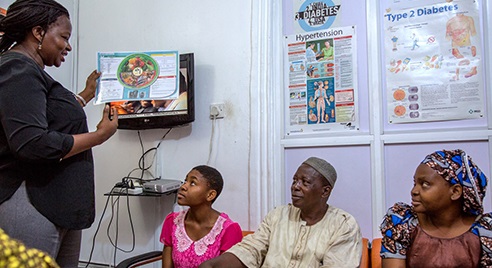Blog
Building the learning agenda
Spotlight on the Global Learning Laboratory for Quality Universal Health Coverage
Improving the delivery of quality health services is messy! Vast amounts of knowledge and experience is being generated daily. We need to help capture this knowledge and experience — both the explicit knowledge that can be easily identified, captured and transferred, as well as the tacit knowledge that is often difficult to identify, capture and transfer.
We cannot assume that knowledge generated at the local level will spread through the various structures at the sub-national and national level to inform national-level direction and eventually lead to global dialogue and action. Mainly the new knowledge that’s generated never spreads and instead stays confined to small teams with big experience. Globally, countries are struggling to capture and learn from different approaches undertaken to improve quality of care in diverse settings.
Global learning informed by local-level action
To address this need, the World Health Organization (WHO) launched the Global Learning Laboratory (GLL) for Quality UHC to activate global learning informed by local-level action. The GLL for Quality UHC aims to create a space to gather and to share knowledge, experiences and ideas; challenge those ideas and approaches; and spark innovation for quality.
The focus of the GLL is three-fold.
- First, national quality policies and strategies which create an enabling environment to continuously improve the delivery of health services and embed quality as a critical component of the system.
- Second, technical areas, which look at the interaction of quality and a specific technical area such as water, sanitation and hygiene; infection prevention and control; maternal and child health amongst others.
- Third, compassion which provides the driving force and heart of the move towards quality.
The importance of the local level
The work of the GLL is heavily informed by what is taking place at the local level on quality. Learning from the local level is then cascaded and shared with a wider audience. Activities of the GLL include, but are not limited to, a knowledge platform, participation in international and local conferences, webinars, and development of knowledge products.

The platform — which seeks to create a community of like-minded individuals interested in quality — is just one of many approaches to learning. For example, knowledge generated from activities at the local level is collected by those who have taken part in the improvement activity. This new knowledge is then assembled and shared on the platform as an action brief — interventions that can be easily transferred to another context; knowledge briefs — theories or concepts that ground implementation; snap-shorts — advocacy tools on specific subject areas; and change alerts which highlight change mechanisms that everyone should know about.
The design of the GLL for Quality UHC is informed by what already exists. A landscape analysis of existing communities was developed to inform the development of the GLL. This has resulted in close engagement with multiple communities and networks involved in improving quality of care.
The GLL for Quality UHC is open to all individuals from across the world interested in improving healthcare quality; engaging in technical dialogue; and contributing on a periodic basis to the discussions pertaining to the three focus areas.
To learn more about the GLL for Quality UHC and to register, visit here. Please share widely with your networks.
Nana A. Mensah-Abrampah is a Technical Officer within the Service Delivery and Safety Department at WHO. In her role, she leads on the global learning agenda on quality Universal Health Coverage (UHC) as well as providing technical and strategic programmatic support in a number of areas pertaining to focused efforts (policy and collaboration) on quality of care. She also contributes to work areas on health service resilience, and twinning partnerships for improvement.
The views expressed in this piece are those of the author(s), and do not necessarily reflect the views of the Institute or the United Nations University, nor the programme/project donors.
Read more on the papers published in the WHO Bulletin theme issue 'Measuring quality of care' at the UNU-WIDER's lauch event website.
 Join the network
Join the network